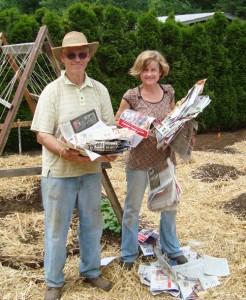
By Brenna Wiegand
What can transform the landscape and cut garden water usage by 30 to 50 percent?
Mulch!
Mulching is simply spreading a layer of something – bark dust is a good example – over the existing soil between plants.
Mulch is (usually) organic material – decaying leaves, grass clippings, bark, rock, sawdust, paper, hog fuel, humus… Filbert shells! Black plastic! I’ve actually seen discarded clothing used. So you see, there is much room for individuality.
I got on the bandwagon this year and mulched my vegetable garden using newspaper and oat straw to create a mulch that holds in precious moisture, squelches the majority of weeds, keeps paths from getting muddy in summer rains and lessens erosion. It insulates and protects plants in all weather extremes.
Since it’s the vegetable garden, I wanted something that would not alter the soil’s pH and that would be an enriching asset to the soil in the long run.
I ended up purchasing six bales of straw at Wilco for $7.49 each; the newspaper cost me nothing. My dad and I completed the 60-by-40-foot garden in about four hours, pausing only briefly to discuss a couple of articles that kept popping up from under the straw.
Fast forward three weeks: I am amazed at how well the mulch is keeping in the moisture, especially in this heat. The antagonizing weeds have been put in their place! Just one thing… We seem to be growing a crop of oats in addition to the kohlrabi, corn and more.
But this turned out a blessing in disguise: The next best thing to mulching is planting a cover crop and it turns out oats are an excellent cover crop. I don’t know how high it’s going to get as I traverse the garden with wheelbarrow, hose, etc., all summer, but I hear that oats protect and enrich the soil and, around here, die off well before planting time. I’ll see if we can’t coexist.
Here are a few more tips:
Start with good soil built up with humus, fertilizer and other amendments to foster a complete, living environment for your plants’ roots.
Get the ground as weed-free as possible. At this time, you can apply a pre-emergent herbicide around non-food plants.
Too much mulch injures plants by keeping the soil too wet and limiting available oxygen to the roots. A couple inches is about right; don’t exceed four inches and leave some breathing room around stems.
Occasionally, dig down through the mulch to make sure the soil has sufficient moisture and that it’s not harboring pests.
Some mulches can leach nitrogen from the soil or alter its pH. Help replenish and balance the soil in your vegetable garden by planting a cover crop between seasons and rotating the location of where you plant certain vegetables each year. You can also add lime to help balance pH.
Vegetables and other temporary plantings have different needs than permanent plantings – check with your local nursery for the best mulch for your needs.